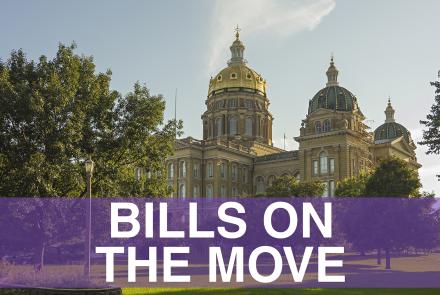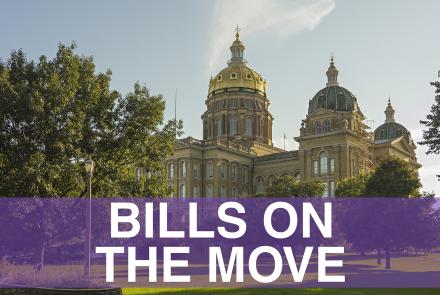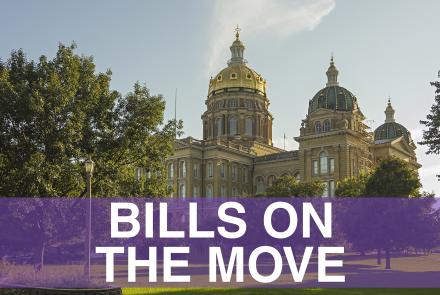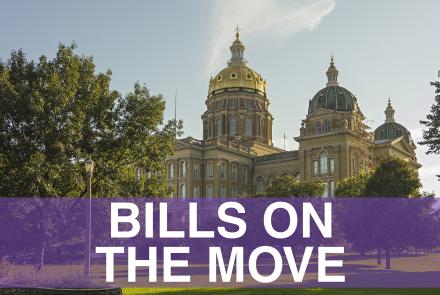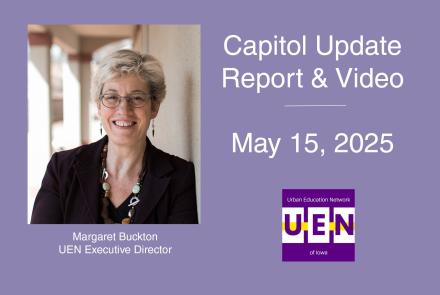Capitol Update - April 20, 2023
UEN Legislative Update
April 20, 2023
Download the print-friendly UEN April 20, 2023 Weekly Report
This UEN Weekly Report from the 2023 Legislative Session includes:
- Completed Work on the Governor’s Education Priorities
- Dueling Property Tax Proposals in the House and Senate
- Appropriations Process: Little Change
- Other House and Senate Action
- Committee Work
- Last Legislative Deadline
- Advocacy Action
- Links to Advocacy Resources
Governor’s Chapter 12 Flexibility:
SF 391 Chapter 12 Flexibility: the Senate resisted the House’s changes to require three units of sequential world languages and fine arts and the House’s action to remove PE flexibility from the bill. The Senate accepted the House’s amendment language on CPR, which means that students will still need to obtain a CPR certificate in order to graduate from high school. After all of the changes and compromises, the bill’s final requirements by Division include the following:
Div. I: Eliminates the Comprehensive School Improvement Plan (CSIP).
Div. II: Teacher Librarian and Counselor Flexibility: allows school districts to hire a librarian previously employed as a public librarian, specifies the BOEE shall not require a masters’ degree for a teacher librarian credential, and requires the state BOE to establish by rules, library standards including a collection and updating process. Also defines the counselors Job: “The program shall be designed to ensure that the guidance counselor can work collaboratively with students, teachers, support staff and admins to support the curricular goals of the school by offering responsive services that address the growth and development needs of students and the attainment of student competencies in academic, career and social areas.”
Div. III: Virtual Snow Days: allows up to 5 days or 30 hours of virtual learning in the school calendar.
Div. IV: Educational Standards – Agreements with Community Colleges
- Flexibility for a Community College instructor to teach any unit to meet offer and teach requirements – all courses under 256.11 (5).
- Strikes the requirement in Iowa Code to make a good faith effort to hire a teacher in that content area before allowing the Community College Instructor to teach it.
- Removes the requirement that it only applies to districts below 600 students and is limited to courses with fewer than 5 students participating.
- Specifies that students enrolled in that course do not count for supplementary weighting (concurrent enrollment) if the course is used to meet an offer and teach requirement.
Div. V: Sequential units in one classroom
- Allows an appropriately licensed teacher to teach two or more sequential units of one subject area in the same classroom at the same time in grades 9-12 (including AP if the teacher meets certification requirements). This would allow AP credit, community college credit and high school credit to be offered by the same teacher at the same time.
- Also allows a community college instructor to teach multiple sequential units.
- Requires the district to offer high school credit for the course.
Div. VI: Education Standards:
- Strikes from current standards:
- Technology literacy from 21st Century learning skills.
- Requirement to teach kindergarteners about role of family, sense of self and perception of others.
- AIDS/HIV references throughout.
- Adds to career exploration a duty to facilitate career readiness and introduce students to career opportunities within the local community and across Iowa.
- Requires two sequential units of world languages and two units of fine arts (which may include any of: dance, music theater or visual art). Current law states four units.
- Mandates excusing a high school student from physical education requirements if:
- Student is seeking waiver to enroll in academic courses otherwise not available, or enrolled in a work-based learning program or activity sponsored by the school which requires at least as much activity at 1/8th unit per week.
- Removes all of the process for principal in consult with counselor. States student shall be excused if parent requests and the student meets any of the above requirements.
- Does not alter the religious exemption process.
- Changes financial literacy: must offer ½ unit, which MAY be offered and taught through dedicated units of coursework or through units of coursework that also meet the requirements of the coursework required under other offer and teach areas (Science, Social Studies, ELA, Math first 4 units or Math 2 more unit, and CTE). District must still meet all of the financial literacy standards and may meet the requirements through any combination of courses. Strikes the requirement that a student complete a financial literacy course to graduate.
- Senate accepted the House’s amendment on CPR certification, so current law remains and high school students must complete CPR certification to graduate.
This bill was amended and approved by the Senate 34:16. The House concurred, 60:36, sending the bill to the Governor. UEN is registered in support.
Governor’s Transparency and Parents’ Rights:
SF 496 Transparency and Parents’ Rights: the Senate removed most of the education policy bill language that the House had amended on to this bill, shortening the legislation from 38 to 18 pages. The Senate approved their changes on Wednesday on party lines. The House voted to concur on Thursday, 57-38, with a few Republicans joining the Democrats in opposition. The bill, now in its final form, includes the following:
- Prohibits any program, curriculum, test, survey, questionnaire, promotion, or instruction relating to gender identity or sexual orientation to students in K-6. Requires age-appropriate materials (defined below). The language specifically excludes private schools from these requirements.
- Deletes HIV and HPV/Vaccine from K-12 health curriculum (still requires instruction on STDs in grades 7-12). Does not prohibit such instruction but removes it from the requirement that it must be taught.
- Requires districts to have a K-12 library program, consistent with educational standards, with age-appropriate materials, and supporting student achievement goals.
- Districts have until January 1, 2024 before penalties regarding library provisions would kick in. If a DE investigation determines the district or an employee has violated the provision prohibiting content in library books that was not age-appropriate, specifies these consequences:
- First violation results in a written warning to the school board or employee.
- Second and subsequent violation, if DE finds the district knowingly violated the requirements, subjects the Superintendent to a BOEE ethics investigation.
- Second and subsequent violation, if pertains to a licensed employee which knowingly violated the requirements, subjects that employee to BOEE ethics investigation.
- BOEE investigations could lead to disciplinary action.
- Defines “Age-Appropriate” to mean topics, messages, and teaching methods suitable to particular ages or age groups of children and adolescents, based on developing cognitive, emotional, and behavioral capacity typical for the age or age group. “Age-appropriate” does not include any material with descriptions or visual depictions of a sex act as defined in section 702.17. Excludes human growth and development grades 7-12 (sex education classes). Requires research-based content and defines “research-based” according to Iowa Code 279.50, which includes the requirement that information is verified or supported by the weight of research conducted in compliance with accepted scientific methods. . . and is free of racial, ethnic, sexual orientation and gender biases.
- Requires each school board to provide age-appropriate and research-based instruction in human growth and development including instruction regarding self-esteem, stress management, interpersonal relationships, and domestic abuse in grades 1-6.
- Prohibits schools from a formal examination or survey of a student-designed to assess the students’ mental, emotional or physical health that is not required by state or federal law without first getting written parent consent. Requires written notice to parents, at least 7 days prior, to administering an exam or survey required by state or federal law. Requires the notice to include a copy of the survey or link to where the parent can access it. Does not apply to vision or hearing exams and makes exceptions for emergent care situations and for cooperating in a child in need of assistance process.
- Requires schools to publish on the district’s website:
- A detailed explanation of the procedures or policies in effect for the parent of a student enrolled in the school district to request removal of a book, article, outline, handout, video or other education material available to students in the classroom or library. Requires the policy to be prominently displayed on the district’s website.
- A detailed explanation of procedures or policies to request a review of decisions made by the school board, including the petition process for a public hearing.
- Requires school board to adopt a policy describing how parents can review instructional materials used in classrooms. Policy must be on the website and must include the process for a parent to opt their child out of material. Access to the policy must be provided to parents annually in writing or electronically.
- Defines instructional materials as “printed or electronic textbooks and related core materials that are written and published primarily for use in elementary and secondary instruction and required by the state or district for use by students in the student’s classes by the teacher of record.” Excludes lesson plans.
- Requires posting a comprehensive list of books available to students in libraries. If the district does not use an e-catalogue yet, allows a request to the DE for waiver for school years before July 1, 2025.
- Requires identity of a parent requesting removal of materials from the classroom or library shall be confidential.
- Requires charter schools to be subject to these same requirements as public schools districts:
- Restrictions on health screenings and formal examinations or surveys designed to assess a students’ mental, emotional, or physical health.
- Prohibitions related to gender identity.
- Requirements relating to sexual orientation and gender ID instruction.
- Restrictions prohibiting a student from serving on a reconsideration committee.
- Specifies parents’ rights.
- Prohibits the school district from knowingly giving false or misleading information to parents of a student regarding the student’s gender identity. Defines gender identity per IC 216.2, subsection 10. “Gender identity” means a gender-related identity of a person, regardless of the person’s assigned sex at birth.
- If student requests accommodation from a licensed practitioner to affirm gender identity, including use of a name or pronoun different than that on the school district’s registration forms or records, the practitioner must inform an administrator who must inform the parent.
- Specifies the same enforcement mechanism for violation of any of the above that applies to the library and age-appropriate regulations.
- Requires DE to adopt rules to implement this section.
- Protection of student rights; requires parent written consent before requiring a student to take part in any survey, analysis, activity or evaluation that reveals personal information about the student or family and lists all of the personal information to which this applies, including the student’s or family’s political affiliations, mental problems, sexual behavior/orientation/beliefs, illegal, antisocial, self-incriminating or demeaning behavior, critical appraisals of close family relationships, privileged relationships, religion or income. There is an exception for income when needed for eligibility in a program.
- Requires prior written notice to the parent to include detailed information about the survey, including the person who sponsors it, how the information it generates is used, and how such information is stored.
- Requires prior written parent consent for an employee to answer any questions or share student information from the survey (except when developing or implementing an IEP).
- Allows students in homeschool (CPI) to receive special education services without the approval of AEA special education director and allows homeschool parents to request special education services for their children. (Process must still follow chapter 256B and rules for 256B.)
- States that parents have the ultimate responsibility to make decisions affecting their child. Makes exceptions for medical emergencies, child abuse assessment, court orders, and specifies that this law does not allow any illegal activity.
- Exempts this bill from Iowa Code 25B.2 (state unfunded mandate law).
- The Senate kept language from House policy bills:
- Includes the language from HF 429 on an open enrollment request within a district if a student is a victim of bullying or harassment. Allows a parent of a student to enroll their child in another attendance center in the district that offers classes at the student’s grade level, if, as a result of viewing a recording created by a video surveillance system or report from a school district employee, and consistent with the requirements of FERPA, the school district determines that any student enrolled in the district has harassed or bullied the student. Requires the DE to have forms to process such a parent request. Requires the school district to enroll the student in another attendance center unless there is insufficient space. Requires the request is for a period of not less than one year, but allows the parent to return to the original attendance center at any time. Further regulates if the student requires special education, the attendance center must maintain a special education program appropriate to meet the student’s needs and does not cause the size of the class or caseload in the special education program to exceed the maximums established in rules adopted by the state BOE. If the student would be assigned to a general education class, there must be sufficient classroom space. If the student has been suspended or expelled, they must fulfill the terms of their suspension or expulsion, but can then request open enrollment to a new attendance center in the district through this process. The decision of the school district may be appealed to the school board. The transferred student is immediately eligible to participate in varsity athletic contests. States that this policy does not prohibit transfer to another attendance center in the district pursuant to a policy adopted by the school board allowing transfer for reasons in addition to this action. Requires the state BOE to adopt rules to administer this section.
- Allows a school district, following their anti-bullying/harassment policy, to notify parents in writing or by email within 24 hours after an employee witnesses, either directly or from viewing a recording from a video surveillance system, any student enrolled in the district harassing or bullying the student. Requires charter schools to have such a policy.
- Requires charter schools to have an anti-bullying anti-harassment policy and procedure.
Along the way, this bill was improved measurably. UEN advocated strongly to remove a graduation requirement for a high-stakes civics test. We also shared concerns about the costs of a searchable database of all instructional classroom materials. The original bill required lists of all contractors or others with whom students might be in contact be published on the district’s website. And there were many other provisions that were eliminated or improved. Although still registered opposed to this bill, we appreciate the strides made in the House and Senate to come up with something that is clearly understood and possible to implement. This bill will be sent to the Governor for her signature.
Dueling Property Tax Proposals in the House and Senate:
SF 569 Property Tax Senate Style Provisions:
- Changes the deadline for school budget certification from April 15 to April 30.
- Changes the budget appeal deadline from April 25 to May 10.
- Eliminates the public education and recreation levy, PERL, effective FY 2027. Allows district currently assessing the levy to continue in FY 2024 and FY 2025. Lowers the levy to 50% of what could be generated for FY 2026. The levy is currently a maximum of 13.5 cents per $1,000 and voter-approved.
- Creates a Taxpayer Statement that must be mailed to taxpayers and requires a public hearing on that notice. Schools must submit the information to DOM by March 15.
- Taxpayer statements are provided to county auditors by DOM and those are required to be mailed to all taxpayers in the district by March 20.
- A public hearing must be held prior to adoption of the school district budget (follow normal publication 10- to 20-day window).
- Allows taxpayers to submit comments at the hearing or in writing.
- Allows taxing authorities (schools, cities, counties, etc.) to reduce levies after this publication, but prohibits any increase.
- The regular public hearing on the budget must still occur after the taxpayer statement hearing.
- Specifies the contents of taxpayer statement:
- Tax levy and tax rate for current fiscal year.
- Effective property tax rate for the subdivision.
- Property tax dollars for the budget year and the tax rate.
- If the budget year amounts are higher, a detailed statement of the major reasons for the increase and the specific program or purpose.
- Example with a residential property of $100,000 value.
- Example of a commercial property of $100,000 value.
- Date and time of this public hearing.
UEN is registered opposed to this bill. The bill was approved by the Senate, 48:1, and sent to the House. The House has not yet assigned it to the Ways and Means Committee.
HF 718 Property Tax House Style Provisions:
- Reduces the school Uniform Levy from $5.40 to $4.40. Pays for the cost of this property tax relief with funding from the Taxpayer Trust Fund, if available. It would otherwise be a cost to the state General Fund. The LSA Fiscal Notes estimates annual costs of this provision:


- Requires taxpayer statements be compiled and mailed to taxpayers prior to budget adoption. Requires districts to send information to the Department of Management, which compiles it and makes it available to the county treasurer. The county treasurer is required to mail out the statements.
- Sets a 3% growth cap in taxes levied on individual parcels. Sets an 8% for commercial and industrial property on an individual parcel. Exempts voted levies or bond refinancing from the calculation. If actual taxes are greater than the caps, then levies are reduced and prorated among all taxing authorities that exceed the caps. We think. There are different interpretations of the language and clarity is needed.
- The limit only applies to levies that were in place the prior year. New levies are exempt.
- Bond issues are limited to November elections.
- The County Auditor must send, not less than 10 nor more than 20 days prior to the bond election, to each registered voter, a notice of election that includes the full text of the public measure to be voted on.
- This bill was originally HF 1, which required a 10% deposit of a construction project in a fund before running the bond issue. That provision is no longer in the bill.
This bill was approved by the House, 98:1, and is now assigned to the Senate Ways and Means Committee with a subcommittee of Sens. Dawson, Driscoll and Winckler assigned. UEN is registered opposed.
Appropriations Process Still in Limbo:
This chart from the IALNS Newsletter shows very little change since last week and no action in the House on the majority of appropriations bills. The Senate has “shell” bills waiting on the calendar, so when the House does act to send over bills with appropriations included in them, the Senate can skip a few procedural steps in the Appropriations Committee. The Standings Appropriations bill, which includes state foundation aid and a few other appropriations impacting schools, has not yet been introduced in either chamber.
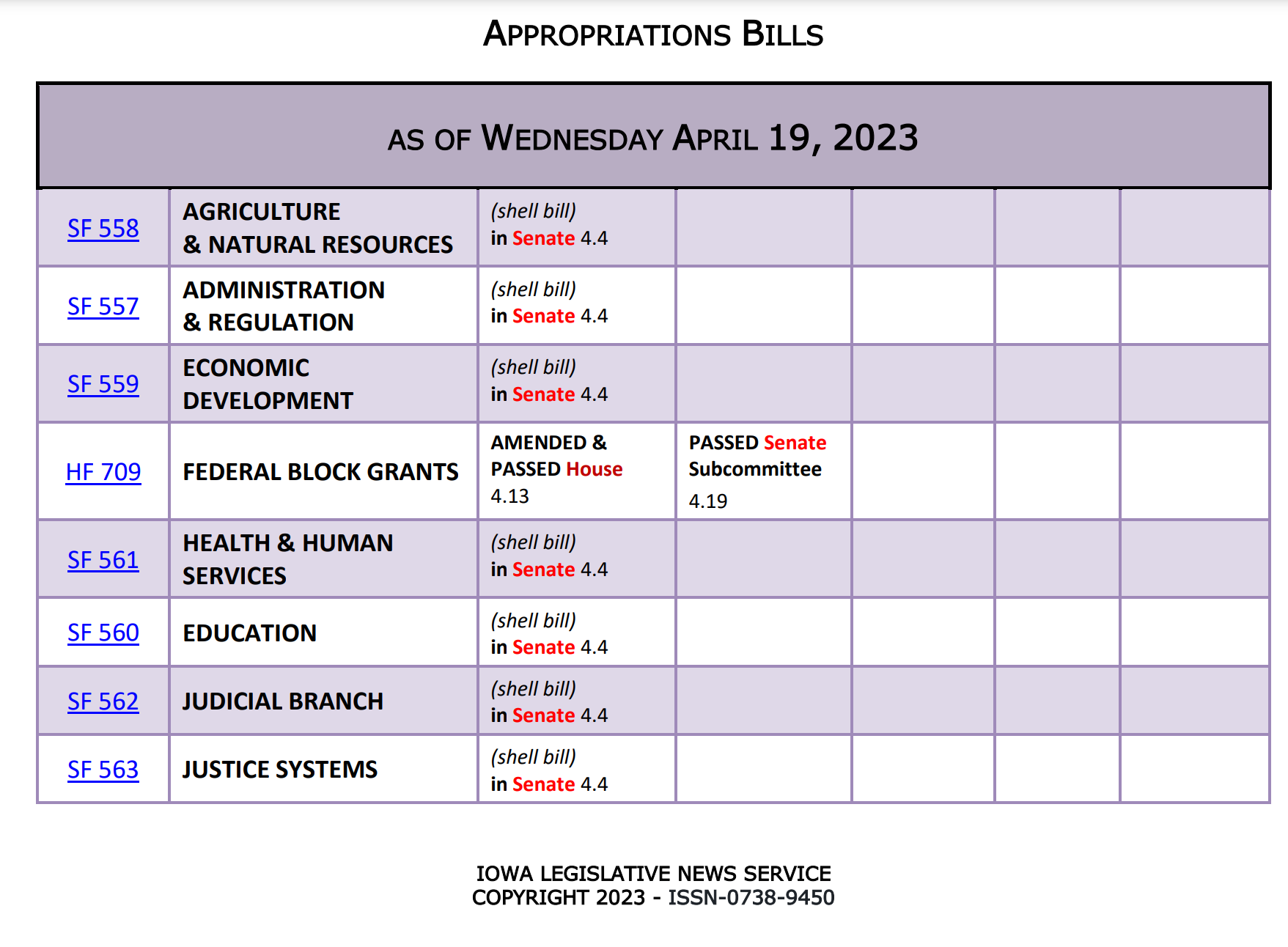
Other House and Senate Action:
- SF 250 Computer Science Professional Development: this bill allows PD funds for computer science to be spent after the close of the fiscal year, through September 30 of the following year. UEN is registered in support. The House passed the bill, sending it to the Governor.
- SF 546 Electronic Notices: this bill originally allowed all public notices, including minutes, agendas and budget certification publications to be posted on a website developed and maintained by the Secretary of State’s office. The bill was heavily amended, and stripped down to just pertaining to publication of bond sales notifications. UEN is still registered in support, but this bill does not provide the relief we preferred from the original version. The Senate passed the bill, 37:12, sending it to the House.
Committee Work:
- SSB 1208 Education Savings Accounts Clean-up: Eliminates public school provision of textbooks to private schools. Prohibits taxpayers from claiming ESA payments for tuition and textbook tax credit. Lowers the School Tuition Organization cap from $20 million, to $17 million and then to $14 million in FY 2025 (still may be too high as nearly all students in private accredited schools will be eligible to receive an ESA by 2025). Requires money remaining in an ESA when a student withdraws, is expelled or does not re-enroll in a private school to be returned to the state. The Senate Ways and Means Committee amended and approved the bill. We will report on the contents of the amendment when the bill received a new number. UEN is registered in support.
Bills Awaiting Action:
- HF 604: Disruptive Students and Ombudsman Complaints: see the March 23 UEN Weekly Report for a detailed description. We anticipate the bill will be heavily amended when considered on the Senate Floor if it moves forward. Now on the Senate Calendar. UEN is opposed to the bill in its current form.
- HF 430: Mandatory Reporters and BOEE: see the March 23 UEN Weekly Report for a detailed description (or read the provisions above that were amended on to SF 496. We expect the bill to be amended when considered on the Senate Floor. Now on the Senate Calendar. UEN is opposed to the bill in its current form, primarily because of the change in the BOEE make-up and the requirement that school districts.
- SF 484 School Finance Interim Committee: requests the School Finance Formula Review Committee to meet in 2023, now on the House Calendar. UEN supports.
- HF 672 Permanent Teacher License: eliminates the requirement of CEUs for licensure renewal associated with licenses issued by the BOEE to practitioners with master’s or doctoral degrees, allows districts to charge fees associated with the review of Iowa Abuse Registries, and background checks for employees of school districts, accredited nonpublic schools, and charter schools (Formerly HF 224.) The bill was approved by the House and is now in the Senate Ways and Means with a subcommittee of Sens. Cournoyer, Brown and Winckler assigned. UEN is registered in support.
- HF 256 Minimum Licensure Age: allows the BOEE to issue a license to someone as young as 18 if all criteria for licensure have been met. On the Senate Calendar. UEN is registered in support.
- HF 614 Licensure for Individuals from Other States/Countries: allows individuals to qualify for an Iowa teaching license without requiring a license from the prior jurisdiction, as long as they can document completion of the coursework and steps necessary to obtain that license. Now on the Senate Calendar. UEN supports.
Last Legislative Deadline:
The next important deadline is April 28, when legislative per diem runs out. Legislators like to finish up by that time, although they can and often do run over. There is a lot still on their plates, so we wouldn’t be surprised to see this Session extended for a few weeks.
Advocacy Actions This Week:
- Say Thank You. Thanks for both Senator and Representatives for getting SF 391 Chapter 12 flexibility across the finish line. Also thank them for their effort to make the Governor’s Transparency and Parents’ right bill clear, possible to implement and less costly for school districts. Also thank them for their service. As school leader understand, it’s not easy to balance the interests of many different stakeholders without making someone angry.
- Talk about Appropriations: Education Appropriations should be increased to support student mental health services, therapeutic classroom grants and early childhood. Encourage both Representatives and Senators to actually appropriate the $10 million in the standings bill for high-needs school grants, rather than cutting this appropriation at the end of session.
- Express Concerns with Senators about HF 718 Property Taxes from the House and with Representatives regarding SF 569 Property Taxes from the Senate. UEN is registered opposed to both. Encourage thoughtful dialogue and a thorough understanding of process and fiscal impacts before moving forward. School districts already have levy limits and spending caps within the formula. Any property tax relief through the formula, such as lowering the uniform levy, will help to make taxpayers happy. Those investments should not, however, be confused with increasing resources for schools and students. Additionally, arbitrary growth caps on levies will alter the working of the formula regarding both student and taxpayer equity.
- Support SSB 1208 ESA Clean-up conversations (New Bill Number Pending). Money should follow students back to the public school if they weren’t counted the prior October 1. Look for a new bill number with changes from the Senate Ways and Means Committee.
- UEN Priorities: in every communication, find a way to mention poverty and preschool.
Connecting with Legislators: To call and leave a message at the Statehouse during the legislative session, the House switchboard operator number is 515.281.3221 and the Senate switchboard operator number is 515.281.3371. You can ask if they are available or leave a message for them to call you back. You can also ask them what’s the best way to contact them during session. They may prefer email or text message or phone call based on their personal preferences.
Find biographical information about legislators gleaned from their election websites on the ISFIS site here: http://www.iowaschoolfinance.com/legislative_bios Learn about your new representatives and senators or find out something you don’t know about incumbents.
Find out who your legislators are through the interactive map or address search posted on the Legislative Website here: https://www.legis.iowa.gov/legislators/find
UEN Advocacy Resources: Check out the UEN Website at www.uen-ia.org to find Advocacy Resources such as Issue Briefs, UEN Weekly Legislative Reports and video updates, UEN Calls to Action when immediate advocacy action is required, testimony presented to the State Board of Education, the DE or any legislative committee or public hearing, and links to fiscal information that may inform your work. The latest legislative actions from the Statehouse will be posted at: www.uen-ia.org/blogs-list. See the 2023 UEN Advocacy Handbook, which is also available from the subscriber section of the UEN website.
Contact us with any questions, feedback or suggestions to better prepare your advocacy work:
Margaret Buckton
UEN Executive Director/Legislative Analyst
margaret@iowaschoolfinance.com
515.201.3755 Cell
Thanks to our UEN Corporate Sponsors
Special thank you to your UEN Corporate Sponsors for their support of UEN programs and services. Find information about how these organizations may help your district on the Corporate Sponsor page of the UEN website at www.uen-ia.org/uen-sponsors.
|
|


